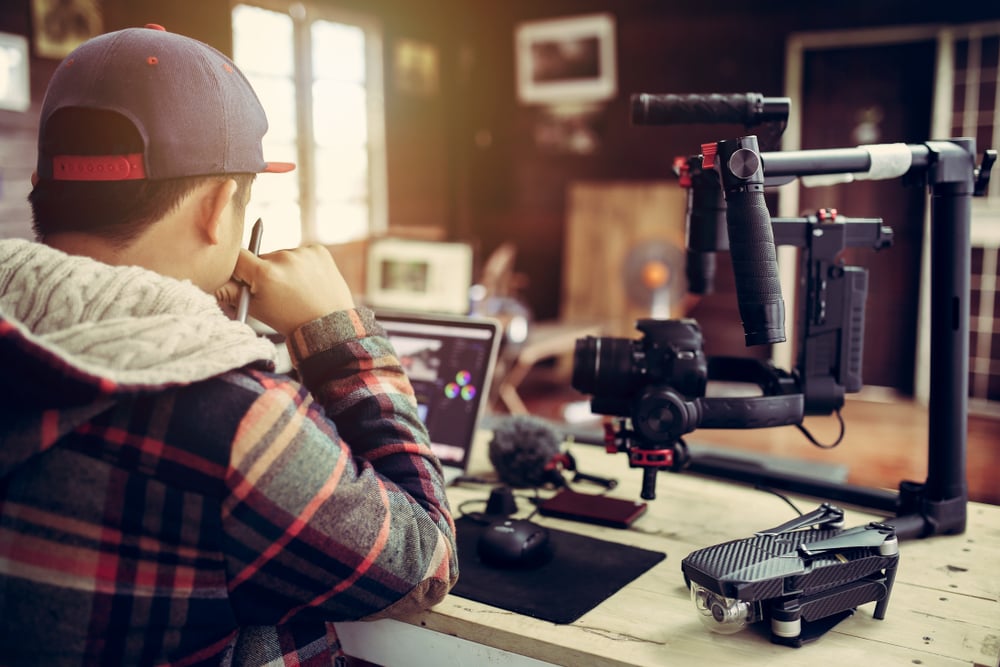What Royalty Free Music or Copyright Free Music Really Means
Soundstripe Team

Apr 16, 2019
*Updated August 2022
(TLDR: If you want access to radio-quality music that won't get you flagged on YouTube, check out our very reasonable pricing options.)
Every video creator can sympathize with the feeling of shooting a stunning video, editing it, and then realizing they still need that perfect track to go with it.
You hop onto the computer, start looking around for free music for videographers, and finally come across websites with royalty free or copyright free music.
It's common knowledge among content creators that royalty free music is the way to go when you want to be legal — but did you know that royalty free or copyright free music doesn't actually exist?
Before you start arguing, or point out that we here at Soundstripe literally provide royalty free music to creators, give us a chance to explain what we mean.
The term "royalty free" implies that you won't be responsible for paying royalty fees when you license music or media. When you license through a royalty free media company, that company pays the song's creator(s) so you don't have to. But the owner of the music is either getting paid or waiving payment — the song isn't actually "free" in either case.
(This saves you money in the long run, especially when you secure a lifetime song license.)
There's more to unpack here, so let's break it down even further.
The short answer to this question is yes. Whether you need music for monetized YouTube videos, corporate video ads, film projects, etc., you can use royalty free music as long as you licensed the music first.
A common misconception is that instrumental music is public domain and therefore doesn't need to be licensed. While there are instrumental tracks available via public domain, most songs are owned by copyright holders — which includes royalty free music companies.
This means that to use royalty free instrumentals in a commercial project, you'll still need to secure the licensing rights. (Fortunately, you can do that easily by licensing through a royalty free music company like Soundstripe.)
While "free" might be in their names, royalty free and copyright free music isn't actually free. However, when you license this type of music, you're cutting out the costs of paying royalties and excess licensing fees.
These terms can be misleading, especially to new creators not yet versed in the legalities of using this kind of music for their videos.
As explained in this video, the definition of "copyright free" simply means that no one owns the copyright to said music or the owner is not claiming copyright. (In a legal sense they still own the copyright, but by choosing not to enforce it, they are stating they won't direct copyright infringement claims at anyone who uses it.)
And in most cases, the original copyright only lasts for a limited amount of time — that duration is 95 years on average, but it could be as few as 70 years or as many as 120 depending on the circumstances around the specific work.
So...yeah, you might have figured this out on your own already, but finding music tracks that that belong to nobody and have 100% zero copyrights is extremely rare.
The vast majority of music you're going to find is, in fact, copyrighted — including royalty free music. And royalties are still being paid, even on music considered royalty free.
Weird, right?
So here's the thing. When you work with a royalty free music site, you are essentially purchasing a license to whatever track it is you want.
This makes you (the licensee) free to use the music in your videos, but the company you purchased the license from is actually paying the composer(s) so you don't have to.
Additionally, if the video is shown on a broadcast network the network will pay performance rights organizations royalties which will then be distributed out to music rights holders.
This essentially means that nothing is actually royalty free, at least not in the grand scheme of things. It simply means you personally won't have to pay royalties, because the company you use covers any of that stuff for you.
Wondering if there are any other assumptions you've made that might be wrong? Here's a quick rundown of facts about royalty free and copyright free music:
A common mistake is thinking that if a track is labeled royalty free, that means it's free to use. Not true! The music must be paid for in order to own the license to use it.
The royalty free music you license from a company like Soundstripe can 100% be used in YouTube videos. Here's a blog post that covers how you can get complete protection from Content ID claims.
Although we threw both terms together, we do want to make a clear distinction that copyright free has no copyright and royalty free means the music does have copyright.
Copyright free music is basically a unicorn, meaning it's extremely hard to find truly copyright free tracks. Almost every track out there has some sort of copyright, even music with a Creative Commons license.
Stock music is another term that is often used to refer to royalty free music. This isn't correct. It can include stock music, but stock music isn't always royalty free.
It isn't just limited to instrumentals or background tunes. You can basically find every type of music as royalty free.
Each royalty free music company works differently so it's important to be aware of terms and conditions before you sign up. (And we might be biased, but we think Soundstripe has one of the best offers for filmmakers.)
With those little nuggets of information out of the way, let's circle back to one more subject pertaining to royalty free music before you delve into why Soundstripe is going to make your life easier.
Finally, just to clear up any confusion, it's worth mentioning as a disclaimer that both copyright free music and royalty free music are not free to use to create your own tracks. Any re-use of music for your own songs is a big violation.
While perusing the web for royalty free music, you're probably going to see something about two other supposedly free music sources — public domain and Creative Commons.
If something sounds too good to be true, it probably is. Here's what these labels really mean and why they aren't a good choice compared to royalty free music.
The term "public domain" is used to describe music that has no copyright and is essentially free for anyone to use. Public domain music would be music published before 1923 or any music specifically released by the creator as public domain.
Just like we mentioned about copyright free music, there isn't a huge selection of public domain music that applies to modern videographers.
The effort you'd put into finding public domain music that might work isn't really worth it compared to using music libraries from a service that licenses music royalty free.
You should also think twice about Creative Commons music. The idea behind Creative Commons licenses is great. It basically allows content creators to use free music (and other media) in their own work.
However, Creative Commons licenses almost always require attribution and they often come with murky terms and agreements.
For example, you might find a killer music track with a Creative Commons license and decide to use it in a monetized YouTube video. You give a shoutout to the creator of the track in the video and/or description box.
Everything seems great until you get an email about you improperly using the Creative Commons music. You might have not first asked permission to the music owner or you used the track for a commercial purpose, not realizing the terms only covered private use.
Creative Commons isn't the most reliable option for music. It's easy to make legal errors without realizing it, and again, the library of Creative Commons music is sparse compared to royalty free.
Soundstripe is all about royalty free music and making life as easy as possible for content creators. Because of this, we do things a little differently than other sites.
We make pricing super simple by offering monthly or yearly subscriptions to access our libraries. Yep, that's right. We don't charge per track. That's tedious, and we think you probably agree.
We have two subscription plans available right now: Standard and Premium. Standard covers unlimited song licenses and lets you make custom playlists. Premium gets you the same thing, but with bonuses like access to 30k+ sound effects as well as pre-released tracks.
There are royalty free music companies out there that hike up prices by misleading customers with their pricing models. We are definitely not that kind of company. Even if you choose just one month of our service, you'll still have unlimited access to our library.
Another cool thing about Soundstripe is that we don't relinquish licenses if you decide to cancel your membership.
Other sites might squeeze some fine print into their agreements about you no longer owning the license to downloaded tracks if you cancel your subscription with them. Even if you cancel your subscription with Soundstripe, every track you downloaded is safe.
Any song license you got with us as a subscriber will remain legally licensed forever.

We hope that you now understand how royalty free music actually works and why it can be misleading. (If you want to learn even more about the best licensing options, this blog post is worth checking out next.)
Although it might not affect you directly, having a better understanding of legal music sources and music licensing ensures that you'll play it safe when it comes to selecting royalty free music for your videos.
Are you ready to take a peek at our library? Not only do we have a huge inventory of tracks, video, and sound effects, but we also put out about 300 new tracks every month.
To get started, all you need to do is visit our pricing page to select a plan and get your account set up. If you have questions, look for the little blue message box in the corner of any Soundstripe webpage — it lets you live chat with someone on our support team.
In the meantime, feel free to look around our website and visit our blog, where you'll find helpful (and free!) tips and tricks about using royalty free music as well as info on videography, podcasting, and more.